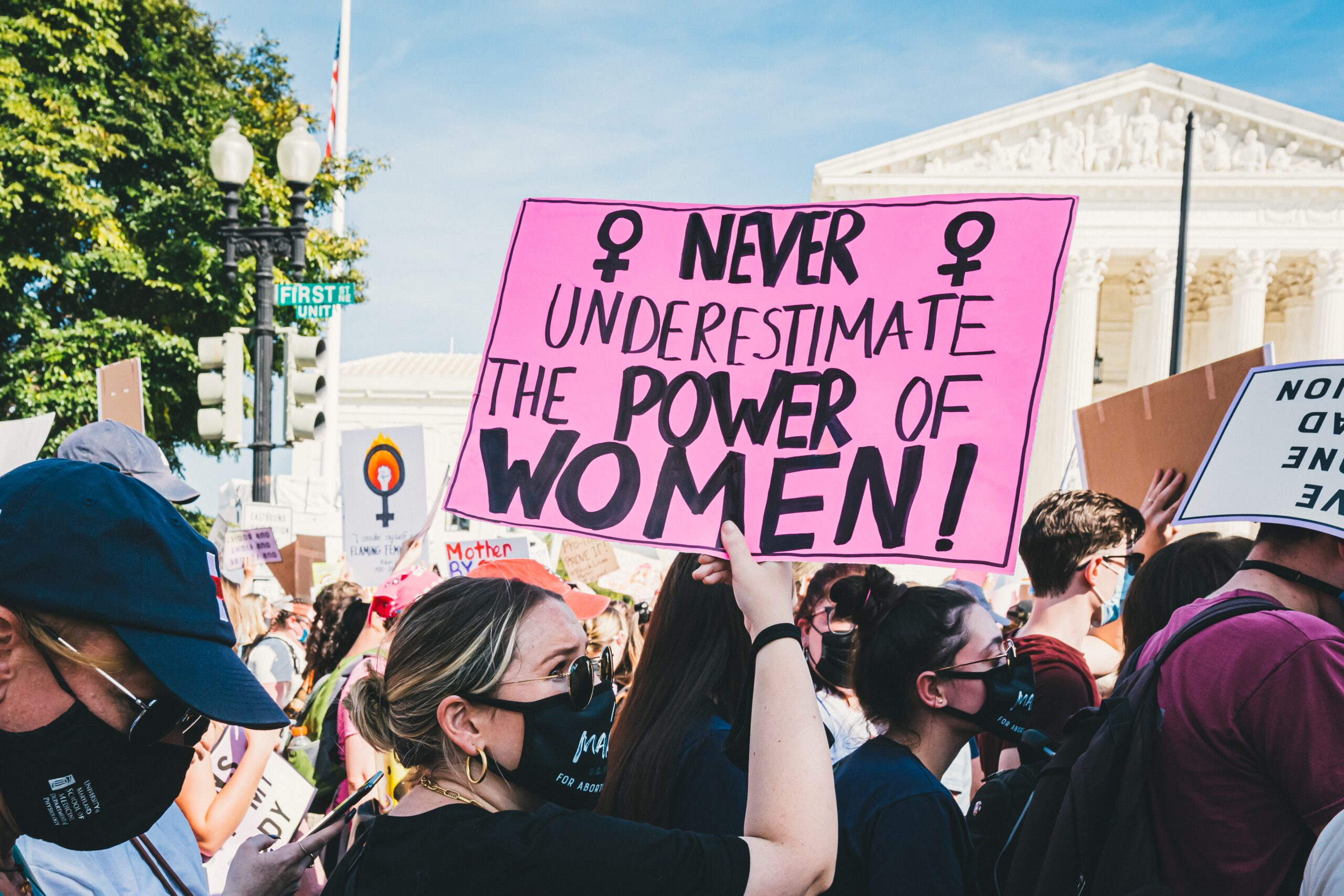Pro-choice Americans need to stop deferring to institutions that don’t represent them and start organizing.
I was 15 in October 1998 when an anti-abortion zealot murdered Dr. Barnett Slepian, a doctor who performed abortions in my hometown of Buffalo, New York. A married father of four, Dr. Slepian had just returned home from his synagogue, where he’d attended a memorial service for his father. It was a Friday evening and he was standing in his kitchen heating split-pea soup in the microwave when the sniper hiding in his backyard shot him in the chest.
I did not know Dr. Slepian, but my family knew people who did. I also knew that two of his young sons were in the room when he was shot. That detail haunted me the most. My father is not a doctor, but he is a kind, caring, socially conscious Jewish man who believes strongly in a pregnant person’s right to end a pregnancy. I adore my father and the thought of two children younger than I was at the time witnessing the sudden, violent death of theirs was hard to bear. Even at 15 I knew that Dr. Slepian’s life had been a full one cut brutally short—one on which many other people, including his children, had depended. What he did with it helped fully formed adult women live theirs. It was the first time I realized that caring for vulnerable women could get you killed.
The U.S. Supreme Court is, following its December 1 hearing about the legality of Mississippi’s most recent abortion ban, widely expected to overturn or gut Roe vs. Wade, the landmark 1973 ruling that formalized a pregnant woman’s human right to end her pregnancy. For nearly 50 years, Roe has prevented states from banning abortion at any time before fetal viability outside the womb. This suggests (a) that a woman has more rights than an incubator; and (b) that a person who exists—one with hopes, dreams, relationships, and obligations—matters more than one who does not.
Reversing or substantially weakening Roe would flip that formula and reduce women from fully fledged people to single-purpose objects. It would make obtaining an abortion a dangerous, degrading, and difficult-to-impossible undertaking for millions of women. At least 21 states will ban or severely restrict abortion virtually overnight if the Court dismantles Roe. Those who believe that forcing a woman to undergo pregnancy and labor against her will is a uniquely misogynistic form of torture are understandably alarmed. A right that’s been under threat for decades is still a right. Abortion bans harm women and their children and terrorize anyone who tries to help them. Overturning Roe would restructure American society for decades to come by forcing into existence millions of children, many of whom will not be adequately cared for.
As a result of laws and policies that limit or ban access to medical terminations, women in the U.S. and parts of Europe are today in greater danger of being prosecuted, punished, or allowed to die horribly from being denied an abortion than they are of being harmed by the procedure itself.
Shockingly, the prevailing response from legacy media outlets in the U.S. has been terrifyingly passive and fatalistic—heavy on doom and gloom and light on practical solutions. Pro-choice voters are being told what we have been told in every election cycle since at least the 1980s: that our most fundamental rights are hanging in the balance and voting has never mattered more. Rarely do liberal columnists remind faithful Democratic voters that our loyalty has been rewarded with the most reactionary Court and the direst threat to Roe in decades. House Democrats did manage to pass a bill in late September that would enshrine the protections guaranteed by Roe in federal law. But thanks to antiquated procedural rules like the filibuster, which President Biden and Democratic senators Joe Manchin and Kyrsten Sinema have been reluctant to eliminate, there’s virtually no chance of passing it in the Senate. Despairing references to The Handmaid’s Tale and the fact that women will soon be legally reduced to “vessels” abound.
This despair is often cloaked in gallows humor, and there is a dark comedy to the whole situation: imagine living in a country where women can do anything—vote, live alone, drive a car, buy a house, get a divorce, become a Supreme Court justice—and still be forced to carry a pregnancy to term, despite the availability of pills that can safely and easily end an early pregnancy in the privacy of one’s home. The most privileged women are the least likely to be denied this right. Women of means, who are used to living freely, will continue to do so. Those who lack money, child care, the ability to travel, supportive partners or family, understanding bosses, and/or other forms of support will suffer even more. But what can we do? First Trump, then the confirmation of Brett Kavanaugh, then COVID, then Amy Coney Barrett, and now this. Given that the right controls the Court, we’re basically doomed, the thinking seems to go. Now get out there and vote Democratic in the midterms!
It’s time to acknowledge that this playbook has failed women for decades. If I were a theist I would consider freedom from forced pregnancy and labor a God-given right, as many deeply religious people do. Just as Black people have always been full human beings with inalienable rights to life and liberty, regardless of what the Court has, at various times, decreed, those with the power to bring forth life have an inherent right to decide whether and under what circumstances to use it. These rights cannot be revoked by judicial fiat; we should stop behaving as if they can. Six judges cannot strip us of a right that exists whether or not they recognize it.
Anyone serious about defending the rights and dignity of all women needs to stop mourning and start confronting state power, as Irish women did in 2017 and Polish and Mexican women did in 2020, and as women in Chile, Colombia, El Salvador, and other Latin American countries did in 2021—in response to far graver threats to their humanity. Even in the U.S., where abortion is restricted but legal, women have been prosecuted for ending pregnancies and having miscarriages. Latin American women, particularly in El Salvador, have served decades-long prison sentences for having miscarriages the authorities claimed were self-induced. Over the last decade or so Marea Verde (Green Wave), a Latin American women’s movement, has helped liberalize abortion laws throughout the region “with aggressive campaigns and mass popular protests organized around legal action and legislative demands that center broadly on women’s autonomy and rights,” as reproductive rights litigation expert Ximena Casas recently explained in The New York Times.
The pro-choice movement in the United States is comparatively piecemeal and diffuse, given the country’s size and diversity, and far less effective than it should be. The 2017 Women’s March, which was described at the time as the largest single-day demonstration in U.S. history, was the last time U.S. women protested sexist oppression en masse. But while I saw plenty of signs referring to abortion rights, the women’s march was not specifically or exclusively about reproductive justice; it was a general expression of rage at Trump’s election. The largest abortion rights demonstration in the U.S. in the last 20 years was the April 2004 March for Women’s Lives, which drew hundreds of thousands of people (organizers put the number at over a million).
There will almost certainly be large street protests in June, when the Court is expected to issue its response. But we cannot wait until then to defend these rights. “I think it’s going to mobilize people to go to the polls,” Democratic Rep. Pramila Jayapal recently said, referring to the impact the Court’s expected ruling could have on the 2022 midterms. “You will see an outcry like you’ve never seen before.” About seven months after the 2004 march, George W. Bush, whose policies had prompted it, was reelected by a clear margin, winning with over three million votes more than his Democratic rival, John Kerry.
In other words, while anger motivated American women to show up for a large demonstration, it did not drive them to sweep Bush out of office or defend abortion rights against further attack. This is partly because U.S. women’s attitudes toward abortion do not differ substantially from men’s; pro-choice Americans, including men, need to defend these rights more vigorously. Voting is not enough. U.S. voters swept Trump out of office in 2020, but only after he had packed the Court with far-right ideologues. And in the absence of major structural reforms—expanding or abolishing the Supreme Court, eliminating the filibuster and passing federal voting rights legislation, amending the Constitution, abolishing the Senate—which many organizers are demanding but the Democratic Party has so far been unwilling to do, we cannot vote our way out of the devastation that will result if Roe is gutted.
There are a number of ways to help:
- Donate to a local abortion fund, share information about where to get the pills that can end a pregnancy and how to use them, and/or identify and refer women to brave and ethical providers willing to break state laws against prescribing pills online and mailing them to patients.
- When I asked Jenny Brown, National Women’s Liberation organizer and author of Without Apology: The Abortion Struggle Now, about current organizing efforts, she cited groups like Plan C and Shout Your Abortion, which have put out clear and detailed information about the pills that induce abortion, where to get them, how to take and dispense them, and what they cost.
- Plan C also includes information about whether and how you or your provider can get in trouble for taking or prescribing these pills. The How to Use Abortion Pill website also describes how to take them, how you can expect to feel afterward, and how abortion laws differ by country.
- Planned Parenthood’s site includes information on how to get abortion pills for cheap or free (the cost varies by location, whether or not you have insurance, and whether or not your insurance provider covers abortion care).
- For now, people in states where telemedicine is legal can order pills from abortionondemand.org for a $239 fee that covers a consultation with a board-certified physician, a medication kit delivered within two to five days, and 24/7 call service and coordination of follow-up care if needed.
- Aid Access, founded by a Dutch physician, gets pills to U.S. women in states with abortion bans via a pharmacy in India.
Although medication abortion has been approved by the U.S. Food and Drug Administration for over 20 years, the agency continues to restrict one of the medications, mifepristone, for reasons that have more to do with politics than safety. According to Carrie N. Baker, who chairs the American Studies department and teaches courses on gender, law and public policy at Smith College, abortion medications are “safer than Tylenol” and “six times safer than Viagra,” which is commonly prescribed and easy to purchase online.
“The Supreme Court doesn’t get the last word on this,” Brown told me by phone. She mentioned the abortion rights bill Democrats passed in the House and could, in theory, pass in the Senate. “Technology has outstripped the anti-abortion strategy,” she added. Women in countries that criminalize abortion have known for years how to end pregnancies safely; according to Brown, pharmacy techs in Brazil discovered that misoprostol could be used to induce abortion when they were warned not to handle the drug while pregnant. “There’s never been a better time to have an at-home abortion than now,” Brown said. “In the 1960s we faced butchery, and that is completely unnecessary at this stage because the pills are widely available overseas.” The FDA suspended rules barring doctors from mailing the abortion pill to patients due to COVID.
On December 16 the agency announced that it would allow doctors to send the pill by mail on a permanent basis—a victory for groups like the American Civil Liberties Union, which challenged the restrictions in court, and one that will enable many more doctors to prescribe the drugs and many more women to order them online and receive them by mail. But over a dozen Republican-controlled states have already passed laws restricting access to the pills, including by outlawing delivery by mail. A Texas law that went into effect on December 2 bans prescribing abortion pills online and mailing them to patients in the state. Providers who break it could be jailed or fined up to $10,000.
Regardless of how the Court rules, women will keep getting abortions, as they did before and after abortion was criminalized in the U.S. and before Roe. There will be protests and marches and underground networks and sympathetic providers willing to break what they know to be unjust laws. Those who refuse to be bullied into abandoning their patients will be threatened, prosecuted, jailed, or worse.
That is why we cannot afford resignation or childlike deference to institutions that have outlived their usefulness, like the Supreme Court. An unelected, unrepresentative, and thoroughly politicized entity willing to endanger pregnant women, their children, and abortion providers has no moral authority. We are not vessels or chattel; we are people, with lives as real and complicated and meaningful to our families and communities as those of any other human being. Reactionary judges are not just threatening choice or women’s health care or a specific medical procedure; they are calling into question our fundamental humanity. There is no reason, especially in the age of the abortion pill, to sit back and let them. There will always be disagreement on the morality of abortion. But the personhood of women and those who care for them is not up for debate.



